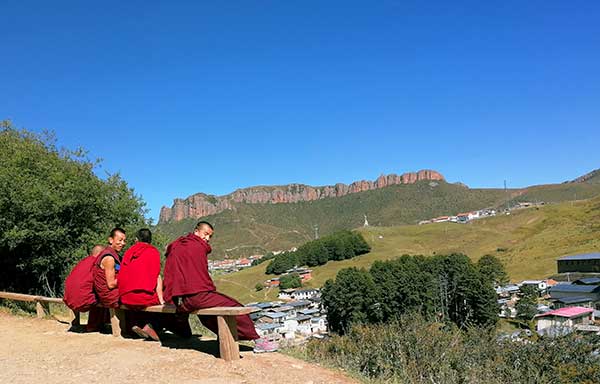- By admin
- In ChinaKnowledge
- 2017-11-28
The Inmitable Wang Zhaojun
For 2,000 years the marriage of Wang Zhaojun has been a popular motif for composers, writers, poets and painters. What kind of a woman would volunteer to be married off to a powerful neighbor in order to secure a temporary peace? Such a figure needs to be assessed against the background of her times. Was she merely a miserable pawn or a person of remarkable integrity? Does she deserve praise or merely sympathy?
Wang Zhaojun, who came from a humble family, was selected for the harem of Emperor Yuandi (reigned 49–33 B.C.). At that time, the Xiongnu (Huns) on China's northern border were beginning to respond to military pressure from the Han Empire. The time was ripe to consolidate the progress made in Han-Xiongnu relations. Among the measures the imperial court took was to give Zhaojun in marriage to Huhanye, King of the Southern Xiongnu. According to historians, the proposal to link the two people through marriage came from Huhanye himself, and Zhaojun stepped forward to be his bride.
"After several years in the palace without an opportunity to meet the emperor," explains one historian, "Zhaojun became resentful and thus she presented herself to the eunuchs, asking them to let her go." When she appeared at the farewell banquet, her beauty stunned Emperor Yuandi, who so far had not met this particular concubine. He regretted having promised such a charming woman to a Xiongnu ruler. However, in his eyes, the dignity and credibility of an emperor were more valuable than a beautiful concubine; thus he merely watched as she was escorted out of his palace to begin her long journey.
It was in 33 B.C. that Zhaojun left Chang'an (present day Xi'an), the capital of Han Dynasty, for what is now central Inner Mongolia. She lived in a palace of yurts, adopted the local diet of meat and dairy products, and bore the king a son. On her husband's death, following the Xiongnu custom, she married his eldest son. By her second husband she had two daughters.
Her native village is now called Zhaojun village. The stream where she is believed to have washed yarn before she was brought to the imperial palace was named Xiangxi (Fragrant Steam) in her honor. Different places in Inner Mongolia are said to be the site of her tomb. Both the one near Hohhot and the one near Baotou are overgrown with such lush grass that each of them is referred to as the Green Tomb.
Zhaojun's story remains a puzzle. Her decision to marry a Xiongnu king at a time when people's attachment to their ancestral homes was strong and Han chauvinism was rampant is hard to understand. Equally puzzling is her failure to be noticed by the emperor despite her beauty and her length stay in the palace.
The celebrated writer Cai Yong (132–192) maintained that Emperor Yuandi did see this particular concubine of his, but he failed to appreciate her beauty. Disappointment and resentment had overtaken Zhaojun after having lived isolated in the palace for years. Thus, claimed Cai Yong, Zhaojun's unusual decision was a retaliatory action against the emperor.
The historian Wu Jun (469–520) cast her decision in another perspective. As Emperor Yuandi's harem grew, according to Wu Jun, he ordered that portraits be painted of all his concubines to form an album for his reference. This stupid order gave the portrait painters the chance to extort bribes from the concubines, whose fortunes depended on how flattering their portraits were. Zhaojun's refusal to bribe them was responsible for the ugly picture of her in the emperor's album. Thus, she had never drawn the monarch's interest until he had to choose one of the eyesores in his harem to be married to the Xiongnu ruler. At the farewell banquet he found that the painters had deceived him. In his rage he had all the portrait painters in the imperial capital executed.
Poetic work about Zhaojun that appeared between the early seventh and the late 13th century were based on amplified versions of Wu Jun's story. The majority of them focus on her journey and underline her resentment. The best example is Wang Zhaojun by the great poet Li Bai (701–762).
Zhaojun grasped the saddle inlaid with jade
And mounted, as tears ran down her rosy cheeks:
Today I am a Han lady of honor,
Tomorrow I shall be a Xiongnu concubine.
Later artists based their paintings on Li's description, and depicted her as a melancholy beauty in a red veil and a marten coat, with a Chinese lute under her arm setting off on her white horse.
It was known that the imperial palace was actually a gold cage for all the members of the imperial harem. Deprived of the right to a normal human life and freedom, they served as slaves and playthings. Whether in favor or out of favor, they were victims of one man's lust. Even the normal satisfactions of marriage and motherhood were denied to them.
For a person born and brought up in the "Central Kingdom," having to leave home for good was an agony. The prospect of living in a region plagued by dust storms where nomadic customs and practices prevailed made the agony worse. The poet's sympathetic description of Zhaojun as she leaves for the northern desert points an accusing finger at the feudal oppression to which women were subjected.
More penetrating comments were made by another great poet, Du Fu (712–770), in one of a series of poems devoted to different historical figures:
Across the ranges and valleys beyond Jingmen*
There is a village known to be Mingfei's home**
She disappeared into the Gobi beyond the Great Wall,
Leaving only a Green Tomb to wave goodnight to the setting sun.
Greedy artists kept her from the emperor,
The moon will fail to bring her ghost to him.
The song sung in foreign words to a lute
Tells of nothing but resentment.
* In modern Hubei.
** During the Eastern Jin Dynasty (317–420), Zhaojun was referred to as Mingfei to avoid the character "Zhao" which appeared in the name of Jin Emperor Sima Zhao. Sharing the same character with an emperor was a taboo in feudal times. The name "Mingfei" has stuck through the ages.
The whole poem implicitly criticizes Emperor Yuandi's arrogance and dissipation, and the cruel practice of maintaining large harems. It also underlines the contrast between the ruler's heartless attitude towards Zhaojun and the people's sympathy for her.
Why Choose Us?
We are the top Silk Road tour operator based in Dunhuang, China. We focus on providing well designed Silk Road China Tours with resonable price and thoughtful service.
- Easy & carefree booking
- The best value
- Great travel experience
- Locally operated
Hot Tours
-

6 days Gansu tour to Binglingsi, Xiahe and Langmusi
Tour type : Private tour Price : from *** Destinations : Lanzhou - linxia - Xiahe - Langmusi - Hezuo - Lanzhou -

12 Days Gansu Highlights Tour
Tour type : Private tour Price : from *** Destinations : Xian – Tianshui – Lanzhou – Xiahe – Langmusi – Hezuo – Zhangye – Jiayuguan - Dunhuang -

10 Days Silk Road Classic Tour
Tour type : Private tour Price : from *** Destinations : Xian - Zhangye - Jiayuguan - Dunhuang - Turpan - Urumqi -

5 Days Zhangye - Alxa youqi Highlights Tour
Tour type : Private Tour Price : from *** Destinations : Zhangye - Alax youqi - Zhangye

